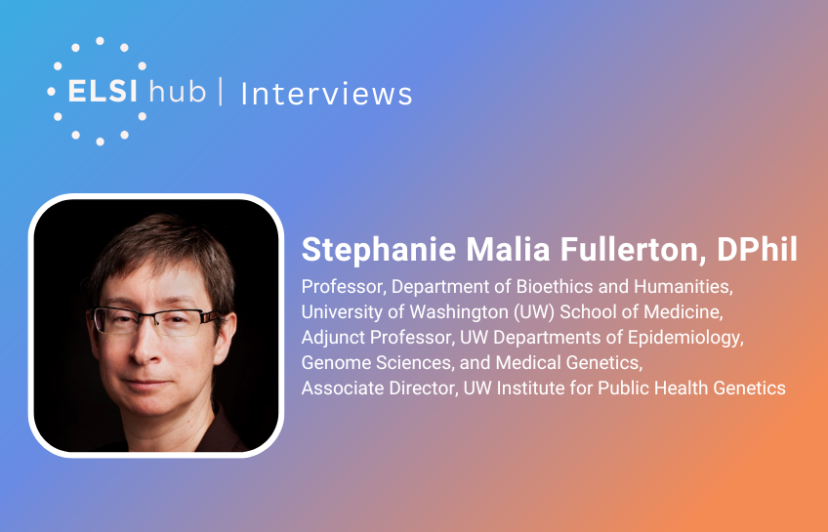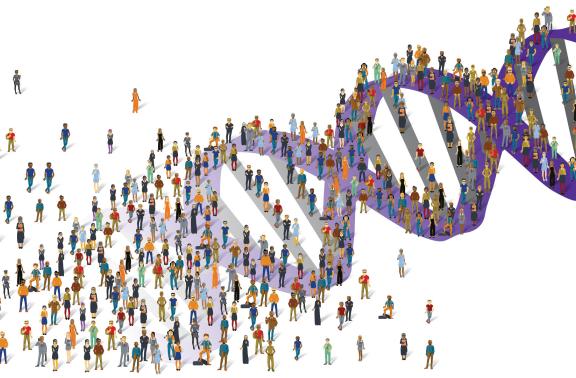
What is the Genomics and Society Working Group at NHGRI?
The Genomics and Society Working Group (GSWG) is the oldest of four working groups established by National Advisory Council for Human Genome Research (NACHGR) (also known as “the council”) to provide in-depth exploration and recommendations related to complex issues facing the field of genomics. Among other functions, the NACHGR charter positions it to advise the National Human Genome Research Institute (NHGRI) on genetics, genomic research, training, and programs and perform second-level peer review for grant applications, including those competing for ELSI research funding from the institute. The GSWG, composed of members of the ELSI research community selected by staff at the NHGRI Division of Genomics and Society, is specifically tasked with providing the NACHGR advice related to planning and priority setting for genomics and society activities at the institute, with particular emphasis on the ELSI Research Program in the Division of Genomics and Society.
CERA spoke with former GSWG Chair, Stephanie Malia Fullerton, D.Phil, to gather and share specific information about the operations and functions of the GSWG and learn her perspective on three proposals for new NHGRI ELSI research funding mechanisms. Dr. Fullerton is a professor in the Department of Bioethics and Humanities at the University of Washington (UW) School of Medicine and an adjunct professor in the UW Departments of Epidemiology, Genome Sciences, and Medicine (Medical Genetics). She also serves as Associate Director for the UW Institute for Public Health Genetics.
Until very recently, the GSWG was co-chaired by Dr. Fullerton and Kyle Brothers, M.D., Ph.D.. Dr. Fullerton’s four year term ended this past week at the spring, in-person meeting of the GSWG in Bethesda, MD. Now that she has stepped away from formal working group involvement, Dr. Brothers, who joined her as a co-chair early in 2023, will be assuming the chairpersonship (with a new co-chair TBD). In addition to Dr. Brothers, the current GSWG members are: Shawneequa Callier, J.D., M.A., Stephanie Russo Carroll, Dr.PH, M.P.H., Gabriel Lázaro-Muñoz, Ph.D., J.D., Marsha Michie, Ph.D., Lisa Parker, Ph.D., Holly Landrum Peay, Ph.D., M.S., Beth Tarini, M.D., M.S., and Genevieve Wojcik, Ph.D..
CERA: Can you tell us how you became the GSWG Chair?
Dr. Fullerton: I was asked to serve in that role by the NHGRI ELSI Research Program staff after having served as a regular working group member for two years, and assumed the mantle from our prior chair, Steve Joffe, MD, MPH, from the University of Pennsylvania. NHGRI Division of Genomics and Society staff, which includes the ELSI Research Program staff and other staff at the division, identify and invite the participation of GSWG members. Each member serves a 4-year term.
CERA: What kinds of advice has the GSWG communicated to the council during your tenure?
Dr. Fullerton: The GSWG meets approximately quarterly and provides feedback and advice to the council concerning the ELSI Research Program at NHGRI. The chair of the working group provides a short report of GSWG discussions and recommendations to the NACHGR annually. I served as a chair of the GSWG from 2022 to 2023 and co-chair (together with my colleague Dr. Kyle Brothers at the University of Louisville) from 2023 to 2024. During that time, I reported to the NACHGR on behalf of the working group twice.
My 2022 presentation focused on the working group’s assessment of emerging priorities for ELSI research, including: the need for sustained attention toward the responsible incorporation of social determinants of health into genomic research, the need to center considerations of health equity and social justice in all aspects of the NHGRI research portfolio, and the need to explore better approaches to community engagement, particularly in the context of gene-environment interaction research. We also suggested that ELSI investigations of non-health related genomics research, including both sociogenomic and forensic applications, continue to be supported by the program. My 2023 presentation returned to similar themes, while noting the recent National Academies of Science, Engineering, and Medicine (NASEM) recommendations on the use of population descriptors and urging the NACHGR to ensure their rapid uptake across the genomics research community.
CERA: Does the NACHGR request specific advice or does the GSWG offer unsolicited advice?
Dr. Fullerton: In my experience, the ELSI Research Program staff will often come to the GSWG with specific questions, e.g., how best to address grantees questions with regard to newer policies, such as the Data Management and Sharing Plan requirement. The NACHGR itself has not brought questions directly to the working group (although certainly some of the questions brought by ELSI Research Program staff are likely to have been informed by NACHGR discussions). Division of Genomics and Society staff, including those at the ELSI Research Program, are equally receptive to unsolicited advice or topics suggested independently by working group members.
CERA: Does the GSWG undertake any formal or informal information gathering process to inform its advisory role?
Dr. Fullerton: GSWG members are selected by NHGRI ELSI Research Program staff to represent a broad range of ELSI scholarship, disciplinary expertise, and institutional affiliation. Topics for discussion are agreed between program staff and the co-chairs in advance and circulated to working group members approximately one week in advance of each meeting. The degree to which individual members gather information to inform their views and/or recommendations is left up to individual working group members to decide.
CERA: How does the GSWG interact with the four program directors of the ELSI Research Program (Sheethal Jose, Dave Kaufman, Nicole Lockhart, and Rene Sterling)?
Dr. Fullerton: The director of the NHGRI Division of Genomics and Society, Larry Brody, the four ELSI Research Program directors, and linked program staff attend every regular GSWG meeting. Staff from other NHGRI programs also participate, e.g., those from the Education and Community Involvement Branch and Program and Policy Analysis Branch.
CERA: We understand that three new ELSI concept clearances (1, 2 and 3), or proposals for new ELSI funding mechanisms, were discussed at the February 2024 meeting of the NACHGR. Could you please describe the role of GSWG, if any, in bringing these concepts to life?
Dr. Fullerton: The GSWG had no direct role, as far as I am aware, in informing the development of these new ELSI funding mechanisms. That said, the GSWG has discussed the need to expand the range of both investigators and institutions competing for ELSI funding, so these new mechanisms are in the spirit of those discussions.
CERA: The first concept, Building partnerships and broadening perspectives to advance ELSI research (BPAER), pronounced “bear”, is intended for U.S. based organizations that receive less than 30 million in NIH funding per year, for the past 3 years. It is designed to address the clustering of ELSI research at a few organizations, with the aims of facilitating partnerships with communities from the general public who are underrepresented in ELSI research and recruiting new scholars to the field. Could you please share your reflections about this concept and predictions about the impact on the ELSI field of study?
Dr. Fullerton: This new funding mechanism is a welcome example of a concrete strategy designed to expand the range of investigators who might consider pursuing ELSI scholarship. The exact impact that such a mechanism will have will depend, of course, on a number of additional factors, including the degree to which less research-intensive institutions have the capacity to administer NIH grants, and the nature of the community partner with whom they may collaborate. Strategic, mutually beneficial partnerships between awardees and more experienced institutions may be needed in the near term to ensure the successful launch of the concept.
CERA: The NHGRI Predoctoral to Postdoctoral Transition Award for Ethical, Legal and Social Implications (ELSI) Research (F99/K00) has two phases, a pre-doc phase (F99) funding dissertation completion and transition into a post-doc for up to 2 years and a post-doctoral phase (K00) for up to 3 years, which can be used for salary, benefits, research and career development, travel, and related needs. It is intended to address the limited number of opportunities for graduate students in the NHGRI ELSI Research Program and support the multidisciplinary training and career transitions that might accompany a career in ELSI research. Could you please also share your reflections about this concept and predictions about the impact on the ELSI field of study?
Dr. Fullerton: This is another very welcome development on the part of the NHGRI which, as I understand it, responds to high levels of interest in ELSI-related topics on the part of predoctoral trainees. As long as associated stipends are funded so that they adequately support tuition and salary needs, this mechanism could bring many folks, from diverse backgrounds, to ELSI research. I am excited to see what happens.
CERA: The final concept is the renewal of the funding mechanism for the next three ELSI Congress research conferences. From your perspective as a long-time ELSI researcher, what is the value of having a biennial ELSI Congress?
Dr. Fullerton: The ELSI Congress is the primary means by which our large, and widely dispersed, investigator community gets together and shares the fruits of our research. As a long-time ELSI investigator, I feel more “seen” at this research conference than any other. I really enjoy interacting with old friends and students, meeting new (at least to me) investigators, and hearing about the latest research. The congress is a marvelous reminder of the vibrancy of our field and I cannot wait to attend IN PERSON this June, after several prior congresses needed to go virtual due to the pandemic.
CERA: Is there anything else you would like to mention?
Dr. Fullerton: I have really enjoyed my time on the GSWG, including learning more about the full ELSI Research Program grants portfolio.
You can explore grantsmanship training videos, view current funding opportunities at the NHGRI ELSI Research Program, or search its grants portfolio on ELSIhub.org.
This interview was reviewed for accuracy by staff of the NHGRI ELSI Research Program.


